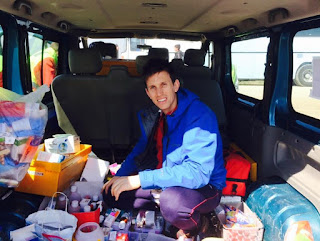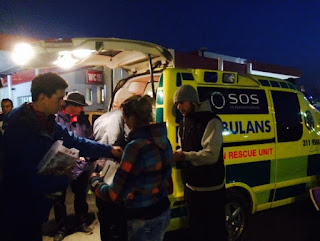Day 4 at Idomeni
I joined a group of volunteer medics organised by Offtrack Health, a grassroots clinic set up by medics who wanted to quickly deploy to crisis areas. It's run from Britain, but has become an organising pole for all the volunteer medics and healthcare professionals coming to the camp.
New people come and go all the time, at present its a couple of British docs, German paramedics from Leipzeig who had been working in a refugee camp there, Swedish paramedics from Skane, an American medical relief group, a Norwegian medical relief group, and various administrative volunteers and translators.
They've rented a house in Polikastro which they are housing volunteers in, and the basement serves as a warehouse for medicines and equipment. We collected supplies from there then, and picked up one of the volunteer translators, Sherin, and drove up to Idomeni. Sherin is a Palestinian, from a town near Haifa, who came to Greece several months back to help translate for the volunteer relief efforts.
When we arrived the police would only allow one vehicle into the camp so we had to put all the equipment in one van and take that inside.
The impromptu clinic works out of the back of the van/ambulance (whichever is available at the time), volunteers and translators take patients age and medical complaint/symptoms, and they're then see by a paramedic or nurse who performs basic diagnostic observations. It's very basic, just pulse, temperature, oxygen saturation, chest auscultation, and a few questions about their recent health; "how long have they had a cough for?" "Is there any sputum?" "Where is the pain, how long has it lasted?" Etc
If they sound chesty, have a productive cough and a raised heart rate, they get a course of antibiotics, if not then it's lozenges and advice to come back if it gets worse. Diarrhoea is treated with rehydration salts and advice about hand hygiene. There are painkillers for back pain and other aches, but we can do little for chronic conditions, of which there are dozens.
The camp is a public health nightmare, when it's cold and rainy respiratory illnesses are rampant, when the sun dries out the ground, all the urine and faeces mixed in the mud dries out and can get blown around as dust, creating masses of gastrointestinal illnesses.
There aren't enough toilets and water points for people to use them regularly, so the problem will persist.
People regularly come and ask us for doses of their regular medications for chronic conditions; cardiac, renal, everything. The medical relief groups don't have resources at present just to hand out supplies of these medications, if they're lucky there might be a packet spare that can be given to them to last a couple of weeks.
MSF has a big clinic staffed with doctors and nurses, but it's overwhelmed and people have to wait for hours to be seen. Medical volunteers try and plug the gaps by seeing non-emergency cases, and giving some treatment to the relatively simple cases. We were getting asked frequently about dental problems, but there are no dental facilities at the camp, so cavities, infected teeth and gum disease go largely untreated.
A biomedical sciences student from Eastern Ghouta, Adel, came and helped translate for the refugees. He had participated in the protests in Syria in the early days, but stopped when the regime began shooting people on a daily basis. "I realised it wasn't healthy for me to attend the protests anymore, so I stayed home. I wanted to complete my studies but it became to dangerous with the fighting, so I left." His family were all already in Germany, and he hoped to reach there and continue his studies.
A sweet young girl called Aya came to the clinic, she didn't want treatment she said, just a cake because it was her birthday and she didn't have any cake. The
German paramedics sang her happy birthday, and we took turns playing hand clapping games with her between seeing patients. It wasn't much but she laughed and smiled which was great.
German paramedics sang her happy birthday, and we took turns playing hand clapping games with her between seeing patients. It wasn't much but she laughed and smiled which was great.
That evening we went to another camp, named Eko, after the gas station which it is next to. Over a thousand refugees are camped out here, in UNHCR tents. Conditions are better than at Idomeni as facilities are better and there are less people. MSF runs a small clinic there and oversees food distribution with Save the Children, supplemented by food from volunteers.
Seeing the white UNHCR tents on the forecourt of a Greek petrol station is a little incongruous.
Ahmed, a Syrian who helped translate for us at Eko remarked "a heaven for European tourists has become a hell for Syrian refugees." He told me he said that to a journalist he was helping, who said it was so good they would put it in their article.
When I asked where he was from, he replied "I'm from Daraa, where our revolution began." As to whether he participated in the protests; "protests, fighting, I've done it all, we all have, everyone took part, men as well as women."
Eko ended up being chaotic and we had to close early. A number of medical emergencies happened all at once; a woman began to give birth, another suffered what may have been a miscarriage, and a young man had the beginnings of what could be a corneal ulcer.
An ambulance was called to take the women to the nearest Greek hospital, and the young man was referred to an eye specialist and MSF arranged for him to be taken there by car. All these emergencies took up all our doctors time, and we had to close the clinic as it couldn't run safely without their oversight. This left about 20-30 disappointed and angry people who weren't seen. Our translators tried to explain, but it didn't make it any easier. One woman sat on the back of the ambulance and refused to leave until she was treated. In the end myself and a doctor gently manoeuvred her off the bumper so we could close up the clinic. Again you feel rubbish, but she had no more or less right than anyone else to be treated, and if we treated her and not others, it would just anger everyone who wasn't seen.
We gathered around the MSF clinic tent where the the pregnant women were waiting for their ambulance, and Ahmed treated us to some english poetry he composed on the spot. It was quite rude so I won't transcribe it here.
Ahmed continued talking about his poetry; "One day I will go to Iceland, and in the beautiful romantic scenery I will compose poetry. I am a real romantic, I will be the Syrian Shakespeare, except I think I will be too rude." A couple of us Brits pointed out that actually Shakepeare was extremely rude in his way, so Ahmed's future work would be entirely in keeping with the Shakespearian tradition...
Once the ambulance picked up the women we left and went for a few drinks. Alex, one of the British docs told me the incidence of drug and alcohol abuse, and sexually transmitted infections were all extremely high for aid workers, as a product of them being around and in contact with the stress and suffering the refugees were enduring daily. It can be exceedingly grim work, with little government support.
When we were discussing the camp one volunteer remarked that without the volunteer relief efforts, probably dozens, if not hundreds of people would have died of exposure and disease over the past few weeks. The work is vital, and it's criminally under resourced.
 |
| Scenery on the way to Idomeni |
 |
| MSFs infrastructure and clinics, also supported by Praksis, a Turkish aid organisation. |
 |
| New tents being assembled by MSF |
 |
| These tens have hundreds of bunk beds when finished |
 |
| Sherin, a Palestinian from Haifa who was one of our translators, with Norwegian paramedic Marianne |
 |
| The "clinic", in the back of the Norwegians van |
 |
| Alex, English GP and former Royal Navy doc overseeing the clinic |
 |
| Me and Adel |
 |
| Aya who we sang happy birthday too. I didn't take her picture, this is from another facebook page, I just stumbled across it. |
 |
| The clinic at Eko camp, now in the back of the Swedes ambulance |
 |
| Ahmed and the volunteers running the clinic |
 |
| The petrol station is closed |
 |
| Sign for MSFs clinic at Eko |
 |
| UNHCR tents at Eko |
 |
| Ambulance to take away the patients |
 |
| MSFs clinic, locked up for the night |







No comments:
Post a Comment